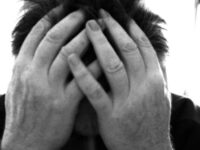- Sleep in complete darkness, or as close to it as possible. Even the tiniest bit of light in the room can disrupt your internal clock and your pineal gland’s production of melatonin and serotonin. Even the tiniest glow from your clock radio could be interfering with your sleep. This will help decrease your risk of cancer. Close your bedroom door, and get rid of night-lights. Refrain from turning on any light at all during the night, even when getting up to go to the bathroom. Cover up your clock radio. Cover your windows—I recommend using blackout shades or drapes.All life evolved in response to predictable patterns of light and darkness, called circadian rhythms. Modern day electrical lighting has significantly betrayed your inner clock by disrupting your natural rhythms. Little bits of light pass directly through your optic nerve to your hypothalamus, which controls your biological clock. Light signals your brain that it’s time to wake up and starts preparing your body for ACTION.
- Keep the temperature in your bedroom no higher than 70 degrees F. Many people keep their homes and particularly their upstairs bedrooms too warm. Studies show that the optimal room temperature for sleep is quite cool, between 60 to 68 degrees. Keeping your room cooler or hotter can lead to restless sleep. When you sleep, your body’s internal temperature drops to its lowest level, generally about four hours after you fall asleep. Scientists believe a cooler bedroom may therefore be most conducive to sleep, since it mimics your body’s natural temperature drop.
- Move alarm clocks and other electrical devices away from your bed. If these devices must be used, keep them as far away from your bed as possible, preferably at least 3 feet. Remove the clock from view.It will only add to your worry when you stare at it all night… 2 a.m. …3 a.m. … 4:30 a.m.
- Avoid using loud alarm clocks.It is very stressful on your body to be suddenly jolted awake. If you are regularly getting enough sleep, an alarm may even be unnecessary. I gave up my alarm clock years ago and now use a sun alarm clock, an alarm that combines the features of a traditional alarm clock (digital display, AM/FM radio, beeper, snooze button, etc.) with a special built-in light that gradually increases in intensity, simulating sunrise.
- Reserve your bed for only sleeping. If you are used to watching TV or doing work in bed, you may find it harder to relax and drift off to sleep, so avoid doing these activities in bed.
- Consider separate bedrooms. Recent studies suggest, for many people, sharing a bed with a partner (or pets) can significantly impair sleep, especially if the partner is a restless sleeper or snores. If bedfellows are consistently interfering with your sleep, you may want to consider a separate bedroom.
- Get to bed as early as possible. Your body (particularly your adrenal system) does a majority of its recharging between the hours of 11 p.m. and 1 a.m. In addition, your gallbladder dumps toxins during this same period. If you are awake, the toxins back up into your liver, which can further disrupt your health. Prior to the widespread use of electricity, people would go to bed shortly after sundown, as most animals do, and which nature intended for humans as well.
- Don’t change your bedtime. You should go to bed and wake up at the same times each day, even on the weekends. This will help your body to get into a sleep rhythm and make it easier to fall asleep and get up in the morning.
- Establish a bedtime routine.This could include meditation, deep breathing, using aromatherapy or essential oils or indulging in a massage from your partner. The key is to find something that makes you feel relaxed, then repeat it each night to help you release the tensions of the day.
- Don’t drink any fluids within 2 hours of going to bed. This will reduce the likelihood of needing to get up and go to the bathroom, or at least minimize the frequency.
- Go to the bathroom right before bed.This will reduce the chances that you’ll wake up to go in the middle of the night.
- Avoid before-bed snacks, particularly grains and sugars. These will raise your blood sugar and delay sleep. Later, when blood sugar drops too low (hypoglycemia), you may wake up and be unable to fall back asleep.
- Take a hot bath, shower or sauna before bed. When your body temperature is raised in the late evening, it will fall at bedtime, facilitating slumber. The temperature drop from getting out of the bath signals your body it’s time for bed.
- Wear socks to bed. Feet often feel cold before the rest of the body because they have the poorest circulation. A study has shown that wearing socks to bed reduces night waking. As an alternative, you could place a hot water bottle near your feet at night.
- Wear an eye mask to block out light.As discussed earlier, it is very important to sleep in as close to complete darkness as possible. That said, it’s not always easy to block out every stream of light using curtains, blinds or drapes, particularly if you live in an urban area (or if your spouse has a different schedule than you do). In these cases, an eye mask can be helpful.
- Put your work away at least one hour before bed (preferably two hours or more).This will give your mind a chance to unwind so you can go to sleep feeling calm, not hyped up or anxious about tomorrow’s deadlines.
- No TV right before bed. Even better, get the TV out of the bedroom or even completely out of the house. It’s too stimulating to the brain, preventing you from falling asleep quickly. TV disrupts your pineal gland function.
- Listen to relaxation CDs. Some people find the sound of white noise or nature sounds, such as the ocean or forest, to be soothing for sleep. An excellent relaxation/meditation option to listen to before bed is the Inside Audio CD. Another favorite is the Sleep Harmony CD, which uses a combination of advanced vibrational technology and guided meditation to help you effortlessly fall into deep delta sleep within minutes. The CD works on the principle of “sleep wave entrainment” to assist your brain in gearing down for sleep.
- Read something spiritual or uplifting. This may help you relax. Don’t read anything stimulating, such as a mystery or suspense novel, which has the opposite effect. In addition, if you are really enjoying a suspenseful book, you might be tempted to go on reading for hours, instead of going to sleep!
- Journaling. If you often lay in bed with your mind racing, it might be helpful to keep a journel and write down your thoughts before bed. Personally, I have been doing this for 15 years, but prefer to do it in the morning when my brain is functioning at its peak and my cortisol levels are high.
- Reduce or avoid as many drugs as possible. Many drugs, both prescription and over-the-counter, may adversely affect sleep. In most cases, the condition causing the drugs to be taken in the first place can be addressed by following guidelines elsewhere on my web site.
- Avoid caffeine. At least one study has shown that, in some people, caffeine is not metabolized efficiently, leaving you feeling its effects long after consumption. So, an afternoon cup of coffee or tea will keep some people from falling asleep at night. Be aware that some medications contain caffeine (for example, diet pills).
- Avoid alcohol. Although alcohol will make you drowsy, the effect is short lived and you will often wake up several hours later, unable to fall back asleep. Alcohol will also keep you from entering the deeper stages of sleep, where your body does most of its healing.
- Make certain you are exercising regularly. Exercising for at least 30 minutes per day can improve your sleep. However, don’t exercise too close to bedtime or it may keep you awake. Studies show exercising in the morning is the best if you can manage it.
- Lose excess weight. Being overweight can increase your risk of sleep apnea, which can seriously impair your sleep. Please refer to my nutrition plan for recommendations.
- If you are menopausal or perimenopausal, get checked out by a good natural medicine physician. The hormonal changes at this time may cause sleep problems if not properly addressed.
Know when to contact your doctor
Nearly everyone has an occasional sleepless night — but if you often have trouble sleeping, contact your doctor. Identifying and treating any underlying causes can help you get the better sleep you deserve.














